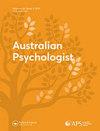临床心理学研究生职业认同形成调查
IF 2
4区 心理学
Q2 PSYCHOLOGY, MULTIDISCIPLINARY
引用次数: 1
摘要
【摘要】目的对澳大利亚临床心理学研究生的职业认同调查甚少。目前的研究考察了这些学生职业认同的潜在预测因素。方法对澳大利亚临床心理学研究生进行匿名、自我报告的横断面调查,通过其所在机构的项目主任发送的在线调查链接进行分发。受访者报告了职业认同、动机、参与、对项目的满意度、恢复力、倦怠、人口统计和入学类型。结果分析了77名被调查者的数据。学生们对心理学家职业认同感的平均得分为4.25/5。年龄、工作经验和项目阶段与职业认同无关。在多变量分析中,较高的学生满意度、较低的职业倦怠和较低的研究生“学生”方面的投入与较强的职业认同相关。结论职业认同水平较高,人口统计学变量对职业认同的影响较小。然而,对研究生学习的满意度和学生的职业认同之间可能存在一种互惠关系,这需要在不同的设计中进行评估,以了解关联的方向。研究结果还表明,支持研究生的自我照顾,帮助学生平衡专业责任和学术方面的学习,可能有助于培养研究生的专业认同。关于这个话题已经知道的:职业身份提供了一种与特定职业的成员关系的自我意识。包括心理学在内的卫生和社会服务专业的学生在他们的学习领域表现出了新兴的职业身份。在工作的专业人士中,人们发现职业认同对幸福感以及与同事和客户的关系很重要。本文补充的内容:澳大利亚临床心理学研究生样本中的职业认同与年龄、性别和以前的工作经验等人口统计变量无关。当前样本的职业认同越强,对学习计划的满意度越高,职业倦怠水平越低。在多变量分析中,较高的学习项目满意度、较低的倦怠感和较低的对项目“学术”方面的参与程度各自独立地预测了较高的职业认同水平。从这些横断面研究结果来看,预测因子与职业认同之间的潜在因果关系仍有待澄清。本文章由计算机程序翻译,如有差异,请以英文原文为准。
Investigating professional identity formation of postgraduate clinical psychology students
ABSTRACT Objective Little research has investigated professional identity in Australian clinical psychology postgraduate students. The current study examined potential predictors of professional identity for these students. Method Anonymous, self-report cross-sectional surveys for Australian postgraduate clinical psychology students were distributed via online survey links sent by their institution’s Program Director. Respondents reported professional identity, motivation, engagement, satisfaction with program, resilience, burnout, demographics, and enrolment type. Results Data from 77 respondents were analysed. Students reported an average 4.25/5 for sense of professional identity as a psychologist. Age, work experience, and stage of program were not associated with professional identity. In multivariate analyses, higher student satisfaction, lower burnout, and lower engagement with “student” aspects of postgraduate study were associated with stronger professional identity. Conclusions Levels of professional identity were relatively high and showed little influence of demographic variables. However, there is likely to be a reciprocal relationship between satisfaction with postgraduate study and professional identity for students, which would need to be evaluated in a different design to understand directions of association. Results also suggest that supporting postgraduate students in self-care and helping students to balance professional responsibilities and academic aspects of study are likely to assist in fostering postgraduates’ professional identity. KEY POINTS What is already known about this topic: Professional identity provides a sense of self in relation to membership of a specific profession. Students in health and social services professions, including psychology, have demonstrated emerging professional identities in their areas of study. In working professionals, professional identity has been found to be important for wellbeing and for relationships with colleagues and clients. What this paper adds: Professional identity amongst a sample of Australian postgraduate students in clinical psychology was independent of demographic variables such as age, gender, and previous work experience. Stronger professional identity in the current sample correlated with higher satisfaction with the program of study and lower level of burnout. In multivariate analysis, higher satisfaction with the program of study, lower burnout, and lower engagement with “academic” aspects of the program each independently predicted higher level of professional identity. From these cross-sectional findings, potential causal associations between predictors and professional identity remain to be clarified.
求助全文
通过发布文献求助,成功后即可免费获取论文全文。
去求助
来源期刊

Australian Psychologist
PSYCHOLOGY, MULTIDISCIPLINARY-
CiteScore
3.70
自引率
5.30%
发文量
32
期刊介绍:
The Australian Psychologist is the official applied practice and public policy journal of the Australian Psychological Society. As such, the journal solicits articles covering current issues in psychology, the science and practice of psychology, and psychology"s contribution to public policy, with particular emphasis on the Australian context. Periodically, Australian Psychological Society documents, including but not limited to, position papers, reports of the Society, ethics information, surveys of the membership, announcements, and selected award addresses may appear in the journal.
 求助内容:
求助内容: 应助结果提醒方式:
应助结果提醒方式:


